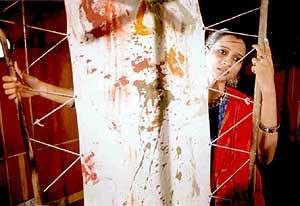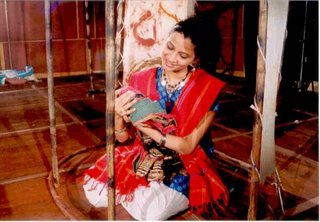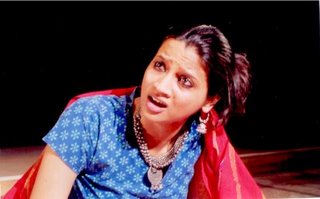
 festival international des arts de la sce'ne
festival international des arts de la sce'ne
ART' sce`ne ,Vaugneray(69)
Du12 au 18 mars 2006Based on Bhishma Sahani’s play
MADHAVImusic by Sangeeta Gaur
Solo performance by RASHI BUNNY ABOUT THE ACTOR- Rashi Bunny Following her graduation in Science from Delhi University and after a brief stint at the Living Theatre Academy under Shi. E Alkazi, Rashi pursued her training in Theatre Arts and Design at the University of Alabama and Rutgers University, New Jersey, USA. She is a recipient of Young Artist Scholarship & Junior Fellowship from department of Culture, HRD and Ruby Llyod Artistic & academic Excellence award and Best International Student Scholarship Award in the USA. She is also Chosen as one of the 50 Icons: emerging personality of India in 2005 by Sahara Group.
Bhishma Sahni's MADHAVI , her first Solo, directed by Arvind Gaur won accolades all over India and abroad.
It received special award for best play in experimentation with tradition at International Solo Theatre Festival Armenia and
“Colour of Nation” award at the International Theatre festival in Russia recently. Madhavi has been invited for performance in the International Theatre Festival March 2006, France.
Manjula Padmanabhan's Hidden Fires was Rashi’s other solo directed by Arvind Gaur that has been selected by SKP as one of the best plays of year. It was also performed for Queen’s award project (UK) for Communal harmony. Walking Through the rainbow, her latest Solo premiered in Chennai and deals with domestic abuse and other NRI issues.
Under the direction of Arvind Gaur, she has also acted in Mahesh Dattani's Tara & Final Solution, Vijay mishra's Tatt Niranjana, Swadesh Deepak's Court Martial and Sabse Udas Kavita, Munshi Premchand's Moteram ka Satyagrah, Rajesh Kumar's Me Gandhi Bolto and Street play Teen Kanastar for Asmita theatre group, New Delhi.
These plays have been performed for various Theatre festivals, Institutions and NGOs in India and abroad including NSD, SKP, Nehru Centre, IHC, Darpana Academy, IIT, Old World festival, Vivechana national festival, Muktibodh Natya Samaroh, World Social Forum, Satta Festival, JNU, IILM, PCVC, Stella Maris, DU, Jawahar Kala Kendra, Action Aid, Heinrich Boll Foundation, Armmono-II (ITI Unesco) and Nizhnevartovsk Theatre Festival.
In USA, even though design was her main focus she acted as lead in many plays like - Beth Henley's Abundance & Jules Feiffer's Feiffers People and worked with directors like Karma Ibsen, Ward Haarbauer and Anne Car Michael. On her return to India, she received the Young Artist scholarship and worked under Shyamanand Jalan in Calcutta and was part of many productions, like Khamosh Adalat Jari Hai and Char Sau Karod Bhullakar. "Nabh Taaron Se Khandit Pulkit" translated from an American Dark comedy, was her directorial debute at Padatik.
As Founder Director of Banjara Theatre Group at IIT Kharagpur, she has designed and directed Dharamveer Bharti's 'Srishti ka Aakhiri admi', Sarveshwar Dayal Saxena's Bakri, Habib Tanveer's Gadhe and many open air productions like Daldal, Swaha-Swaha, Bandar Kaun, Girgit, Pahle Aap, Teen Apahij, Deewaren Kuchh Kehna Chahti hain, Haathi ki Po(n) etc. For the Children's Theatre Wing of Banjara, she has written and directed musicals like Veer Abhimani, Aazadi Muft Nahin, TunTun TunTun Tana Bana, Education gives Real Freedom, Gopi Gayan Bagha bayen, Beda Dekho Ki.
Rashi has conducted theatre workshops for Engineering and management students, children, Youth and adults from all kinds of background and judged many drama competitions in Bengal, Delhi and Rajasthan. For IHC, she has conducted Theatre workshops and was the coordinator for the Platform theatre. She is guest faculty at NIFT and has lectured widely in schools, colleges and institutes of repute in India and abroad.
WHY MADHAVI ? A story based on character older than 5000 years. And still alive… A Madhavi, who lives in a society that thrives under the auspicious umbrella of ever-forgiving religion and traditions. The norms, the rules of a society that have only changed names from Madhavi to Mansi or Mona.
Theories not documented on paper but in the closed minds of society, and practices only made modern but still the same. Daughter is wedded and father performs the sacred rites of "Kanyadan". Still a "Daan" or donation. Yayati gives away Madhavi because that's what his "duty" binds him to do. Madhavi stands amidst the keen stares of men in King Haryasch's court where the kingdom's astrologer weighs upon Madhavi's body - her statistics, skin, shapes. How different is any matrimonial add of today's national news papers? Lecherous Divodas accepts Madhavi because she is prolific son-generating machine. A son is still considered a choicest choice. Galav markets her professionally and stoically.
A woman of beauty and intelligence born with unique gifts and special abilities spends her entire life in abiding by and standing for the secret promises, vows, desires and aspirations of the man who fathered her, the man she loved and men whom she consummated without marriage. Each man utilized her for his selfish interests in the name of "Dharma". They framed her youth, beauty, sincerity and devotion and painted the colors of their desires and ambitions on the canvas of her fading individuality. They used her boons to avail their interest and she kept on giving and yielding and sacrificing for the sake of respect, love or plain duty. "Dharma" is, you see, the umbrella under which all wrongs will be shielded because it has got a sky above it, large and valuable of the scriptures written by men and rules created by men.
We may call ourselves an evolved post-modernistic world but is there a woman who at a certain age or stage in life, did not sacrifice for a man who thought his ambitions and wishes more important or more noble or more sacred than her dreams?? Madhavi still lives - more conventional and easily identifiable in rural set ups and more masked in the metropolis.
Late Bhisma Sahni was a writer of the masses and not classes. His characters and stories, like Chekov, are based on triumphs and traumas of a common man; not very well known characters but people with great sensitivity, sensibility and zeal for life. His plays have a whole panaroma of varied character who even in their stereo-typical presence convey various shades of "man". Wound with its own wit and humor, the plays are essentially tragic.The content, the theme, the treatment of the issues in his plays are socially relevant and progressive even if they have historical or mythological base. With great sensitivity and panache, the tragic tale of a simple dutiful girl is told who is merely a victim of an inherently flawed system, created by man himself.
Unlike classical or Greek tragedies where the grand tragic end of the character was determined by his height and status in royal hierarchy here the playwright relies on destiny as much as making the special talent of the protagonist as the cause of his/her own disaster while restraining from making the play slogan-based.
Madhavi is not a myth, she is a reality. Madhavi has not been vanquished by history, sadly like the legend of Gaea, she still lives either in the self-imposed glory of her sacrifice or the heart-rending solitude of her abandonment.
THE MAKING OF MADHAVI Madhavi is a result of an agitated exploration that continued to pose questions again and again about the presentation, representation and performance. A 3-act full-length play with more than 16 characters written by an eminent writer like Bhishma Sahni to be converted into a Solo performance? So many characters - all old stereotypic chauvinistic male except one - all to be performed by a young girl? That too a girl whose parentage, bringing up and urban modern education made her almost odds with the female character Madhavi, on whose life and destiny the play is written. The text was opened layer by layer and discarded completely line by line to explore the basic essence of the script. As that became clearer through brainstorming and discussion and fierce argumentation between the actor and the director, Bhishma Sahni's script was picked up again and it was inventively interpolated so as to make it available for a solo performance.
From text one moved to images. What sort of visual landscape could we create so as to not just depict the life of Madhavi but also take the audience as a participant in the journey through her life? Almost magically cloth canvasses encompassed in vividly shaped light bamboo structures emerged that not only aesthetically excited us but also had promise in terms of flexibility of movement by way of Solo performance to depict many locales, time periods and psycho-physical spaces of various characters. We thought of collaborating with modern imaginative painters to render symbolical images on these canvasses. As usual, the lack of funding forced us to be resourceful and
we discovered something, what lead to us to an absolutely unexpected thrilling journey. We discovered during the first performance that the use of colours on the canvas by the actor during performance, almost invented a new language in performance. The selection of earth colours like turmeric, henna, sindoor, clay etc was natural. The bamboos, canvasses and wheat-flour, rice and color powders on stage at one moment brought the royal galore of the kings and kingdom, forlorn peace of Ashram, harrowing heights of long journeys in jungles and a sudden transition into neutral platform for narration.
Now the painting at the opening and during the performance became a play of colors for the performer that was not at all aimed to represent the psycho-emotional state of the character. What came as a wonderful welcome surprise was that what one was touching a dangerous area - the sub-conscious of the actor during the performance. For, it was realized that through the coloring of the canvasses the boundary between the actor and character was blurring and sharpening recurrently. Although since the process was more or less a continuum and to pinpoint was hard, mostly the result was actually the sub-conscious response to the sub-text of the play MADHAVI. So many characters (real, fictitious and from the play) merged and forged their individuality, the actor maintained the alienation of an actor and journeyed with them, a facility imposed by the design of the play as a solo performance. And the idea was to take the play as Story-telling (katha-vachan style) by a modern urban girl talking of the life of a fellow member of the same species, many a times the narrator told the story while the body acted a character and many such interpolations were experimented on!
Critics Says Even though the play is based on mythology, Madhavi .It was adelightful solo performance by Rashi Bunny, as is contemporary in its presentation and style
India Today All women will be able to see a part of themselves in it. The relevance of the issue makes the time setting immaterial
Indian Express Its 'an actor's play'. The Kathavachan style has been adopted and the actor Rashi relates to the audience in day to day baat cheet…an intense and intimate theatre experience.
The Pioneer The solo performance is an experiment. Its like taking people through a journey. Even the set design is very experimental. There are blank canvasses on the stage and different colours placed in earthen pots, that symbolize the different colours of life.
First City It was a delightful solo performance by Rashi Bunny, as she brought to fore a range of human emotions in 'Bhishma Sahni's MADHAVI...it is an experiment both in its presentation by the director Arvind Gaur and its enactment by the actor Rashi. the Set and its use to my mind is indeed creative bordering on the genius.
The Hindu The complex story of Madhavi, her trauma, tragedy and conflicts were portrayed with great sensitivity by Rashi Bunny... The simplicity of set design, use of bamboo structures, canvasses & helped audiences to extend their imagination to grasp the diversity and multi dimensional directorial interpretation of the play.
Nav Bharat Times Rashi the woman, Rashi the actress, all boundaries fade as she immerses herself completely, unabashedly in her roles. The play was among the very rare meaningful theatre we get to watch in our city. Thought provoking, overwhelming, it left so many fighting their tears. Each person present would have identified with the double standards of our society, each person sitting there would have felt guilty of having reduced the existence of a woman to a mere object, a commodity. Each woman would have relived some part of her life.
Hindustan Times http://theatredirector.blog.com/ Musicians- Babli Srivastava, Anil Mishra , Satish Soni, Sushil Sharma
lyrics- Piyush Mishra
Back Stage- Sandeep Srivastava, Ajeet , Praveen , Bhopal, Prageet, Abhisek,Siddarth
ABOUT THE DIRECTOR Arvind Gaur who heads the Delhi, based Theatre group ASMITA is committed to innovative and socially relevant theatre. Starting off as a journalist and working for sometime for the electronic media, he set up ASMITA and earned a reputation in theatre circle in India and abroad.
Arvind Gaur has conducted many theatre workshops and performed in various Colleges, Institutions, Universities and Schools in India and abroad such as Stanford, Harvard University, Stony Brook Univ, Smithsonian (Washington DC),Nehru Centre( London), Jawahar Lal Nehru University, IILM , I.I.T.(Delhi) , AIIMS , School of Planning and Architecture, Gargi, Hindu, LSR and IP colleges. He was also the guest faculty of DU for Theatre in education program for three years.
One of the Solos directed by Arvind gaur- Bhishma Sahni's MADHAVI received special award last year for best play in experimentation with tradition at International Solo Theatre Festival, Armenia. "Madhavi" was recently invited at International Theatre Festival, Russia and is now scheduled for performance in International Theatre festival, France.
Director Arvind Gaur has also collaborated with various Theatre artists and Groups specially in exploring a new language for Solo performances which includes Dario fo's 'Story of the Tiger', solo by Jaimini Kumar Srivastava, 'Women in Black' by Bubbles Sabharwal and "Untitled Solo" by Lushin Dubey in collaboration with Theatre World. Not only have these plays received great audience response from important metropolis of India, "Women in black" was invited to perform in Dubai and "Untitled Solo" was performed in Chicago, Dallas, Washington DC, Boston, Rochester, San francisco, Ohio in USA and at the Edinburgh Theatre Festival last year.
Pinki Virani’s "Bitter Chocolate " a new solo by Lushin Dubey directed by Arvind gaur was also performed at Harvard (USA) & at Nehru Centre, London. ‘Gandhari’ solo performance by Aishveryaa Nidhi was directed & performed at NIDA theatre , Sydney. Recently with British actress Ruth Sheard, he has directed two solo plays-
Sarah Kane’s “4.84 Psychosis” and
Dario Fo- Franca Rama’s “A woman alone”.
With
Rashi Bunny, young actress trained in Theatre design at University of Alabama at Birmingham and Rutgers University, New Jersey, USA Arvind Gaur has directed three solo plays. Bhishma sahani's "Madhavi ",
Manjula Padmanabhan's 'Hidden Fires' and 'Walking through the Rainbow'. Madhavi & Hidden fires has received rave reviews all over and have been invited to perform for Mahindra's Old World Theatre Festival, Vivachana National Theatre Festival Jabalpur, Muktibodh Natyaotsav raipur, 5th National Theatre Festival Balaghat, World Social forum Mumbai and National School Of Drama (N.S.D.), Satta Festival Jaipur, Theatre Club J.N.U., PCVC, and Queen's Award Project (UK) for Communal Harmony.
After his fellowship research from HRD, he started his Delhi based Theatre group
ASMITA. Arvind Gaur has directed more than 50 plays which include Girish Karnad's Tuglaq and Rakt Kalyan, Dharamveer Bharti's Andha Yug, Swadesh deepak's Court Martial, G P Deshpande's Antim Divas, Albert Camus' Caligula, Mahesh Dattani's Final Solutions and Tara, Eugene O'neill 's Desire Under the Elms, Dario Fo's An Accidental death of an Anarchist, Dr.Narenda Mohan's Kalandar, Bertolt Brecht's Good Woman of Setzuan and Caucasian chalk circle, Samuel Beckett's Waiting For Godot, John Octanasek's Romeo Juliet and the darkness, Neil Simon's The Good Doctor, Vijay tendulakr's Ghairam Kotwal, Munshi Premchand's Moteram ka Satyagrah, Ashok Lal's Ek Mamooli aadmi, Rajesh Kumar's Me Gandhi Bolto ,Vijay Mishra 's Tatt Niranjana, Doodnath Singh's Yama Gatha.
Arvind Gaur has conducted many theatre workshops for children in schools and slums as well as Street Theatre performances on different socio-political issues. He has also conducted theatre workshops for Actors and Directors at Houston, USA and India Habitat Centre, New Delhi. He also performed various plays in collaboration with organizations like Theatre World, British Council (Chennai), NSD, SKP and Sangeet Natak Akademi, IHC, Paridhi, Bahroop, Banjara Theatre group (IIT, Khargpur),IIC, Rainbow Cavaliers, M.Dot Band (Jaipur),Vivchana (Jabalpur), Prithvi Theatre Festival (platform theatre IHC, 2004), Ladies Club( IIT Bombay) and NGOs like Mobile Creches, Action-Aid, Haq, PCVC, Times Foundation, Deepalaya , Miralaya, Heinrich Boll Foundation, Asian Social Forum, Youthreach, World Social Forum etc.
He also designs lights for NAYA Theatre under the Direction of Shri
Habib Tanvir.
arvindgaur@hotmail.com , arvindasmita@yahoo.com
rashibunny@yahoo.com





